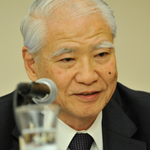Registration
Thank you!
You will receive an email confirming your registration.
 IMGXYZ1189IMGZYX Extended deterrence is back on the analytic and policy agenda. North Korea's nuclear test, China's rising power, Russia's assertiveness, Iran's unceasing uranium enrichment, and American interest in nuclear disarmament have renewed U.S. allies' attachments to extended deterrence. How are the challenges and requirements of credible extended deterrence evolving? How should deterrence be integrated with reassurance and cooperation in overall security strategies in Europe and Northeast Asia? What role, if any, should nuclear weapons play in extended deterrence?
IMGXYZ1189IMGZYX Extended deterrence is back on the analytic and policy agenda. North Korea's nuclear test, China's rising power, Russia's assertiveness, Iran's unceasing uranium enrichment, and American interest in nuclear disarmament have renewed U.S. allies' attachments to extended deterrence. How are the challenges and requirements of credible extended deterrence evolving? How should deterrence be integrated with reassurance and cooperation in overall security strategies in Europe and Northeast Asia? What role, if any, should nuclear weapons play in extended deterrence?
